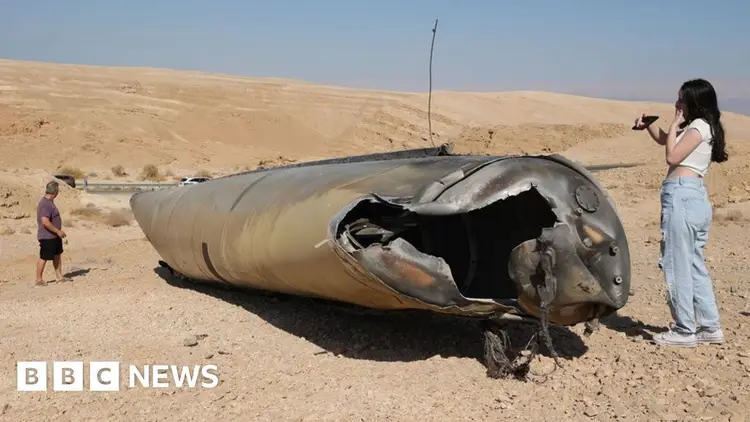How could Israel respond, and what might Iran do then?

The Middle East is once more teetering on the edge of a severe and destructive conflict between two rival sides that have been in opposition for a significant portion of the last 45 years. This situation marks one of the most perilous times for the whole region.
Since the Shah was ousted in 1979 and Iran established itself as an Islamic Republic, the country has consistently promised to eliminate Israel, referring to it as the "Zionist regime." Israel holds Iran's Revolutionary Guards Corps (IRGC) responsible for promoting turmoil throughout the Middle East via its network of allies and proxies, a perspective that is also supported by numerous Arab nations.
Israel is ready to respond to Iran following the series of ballistic missiles launched on Tuesday, a number of which managed to breach Israel's air defense systems.
Iran claims that its actions were a reaction to the assassinations of the Hezbollah leader Hassan Nasrallah in Beirut and Hamas leader Ismail Haniyeh in Tehran, both attributed to Israel.
What comes next?
Israel and its primary partner, the United States, have pledged to take action against Iran following the launch of 180 missiles aimed at Israel. Israeli Prime Minister Benjamin Netanyahu stated, “Iran will face significant consequences.”
The pressure that Israel's allies applied during the previous standoff in April is less pronounced this time around. With Israel now intent on confronting all its adversaries simultaneously—across Lebanon, Gaza, Yemen, and Syria—the Netanyahu government appears unwilling to pull back.
Israeli strategists are probably now discussing not whether or when to strike Iran, but the intensity of the attack.
With the support of satellite intelligence from the United States and on-the-ground operatives from Mossad, Israel's intelligence agency, the Israel Defense Forces (IDF) have numerous potential targets at their disposal. These can generally be classified into three main groups:
Traditional military actions would likely focus on the locations from which Iran fired its ballistic missiles. This includes launch sites, command and control facilities, refueling stations, and storage areas. The targets could extend to IRGC bases, air defense systems, and additional missile sites. There might also be attempts to eliminate important figures connected with Iran's ballistic missile initiatives.
Economic - This would encompass Iran's most at-risk state resources, such as its petrochemical facilities, power generation capabilities, and potentially its shipping operations. Nonetheless, this approach would likely face significant opposition within Iran, as it would adversely impact the daily lives of ordinary citizens to a greater extent than any military strike.
Nuclear Issues - This is a major concern for Israel. The International Atomic Energy Agency (IAEA), the UN's nuclear oversight body, has confirmed that Iran is enriching uranium at levels significantly higher than the 20% required for peaceful nuclear energy. Israel and other nations fear that Iran is aiming to reach a “breakout point,” which would allow it to quickly develop a nuclear weapon. Potential targets for Israel might include Parchin, the center of Iran's military nuclear activities, as well as research reactors in Tehran, Bonab, and Ramsar. Key facilities on their radar also include those located in Bushehr, Natanz, Isfahan, and Ferdow.
Much of their analysis will focus on predicting how Iran will react and how to reduce any potential impacts. Iran maintains that following their missile attacks on what they claim were Israeli military sites on Tuesday, the issue is resolved. However, they have also cautioned that if Israel responds, they will retaliate as well.
"Iran's President Masoud Pezeshkian remarked, 'This is just a preview of what we can do.' The IRGC added to this sentiment, warning that 'if the Israeli regime reacts to Iran's actions, it will encounter devastating strikes.'"
Iran is unlikely to overpower Israel through military means. The country's air force is outdated and in poor condition, its air defense systems have significant vulnerabilities, and it has faced numerous years of sanctions from Western countries.
However, it still possesses a significant arsenal of ballistic missiles and various other types of missiles, along with drones equipped with explosives, and supports many allied proxy groups across the Middle East. The next round of missile strikes could potentially focus on civilian neighborhoods in Israel instead of military installations. The 2019 assault by an Iran-supported militia on Saudi Arabia's oil facilities highlighted the susceptibility of its neighbors to such attacks.
The IRGC Navy, active in the Gulf region, possesses substantial groups of nimble missile-armed boats that could potentially launch a coordinated swarm attack, overpowering the defenses of a US Navy 5th Fleet vessel. If given the command, they might also deploy mines in the Strait of Hormuz, disrupting the passage of around 20% of the world's daily oil shipments. Such an action would significantly affect the global economy.
Additionally, numerous US military installations can be found along the Arabian side of the Gulf, stretching from Kuwait to Oman. Iran has issued a warning that if it faces an assault, it will not limit its response to Israel alone; it will also strike any nation it views as backing that attack.
These are just a few of the situations that military strategists in Tel Aviv and Washington will be evaluating moving forward.









































